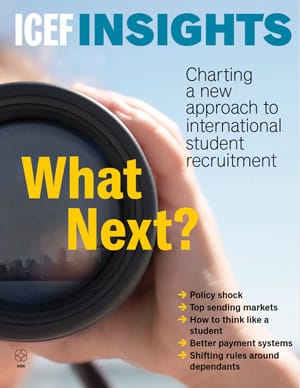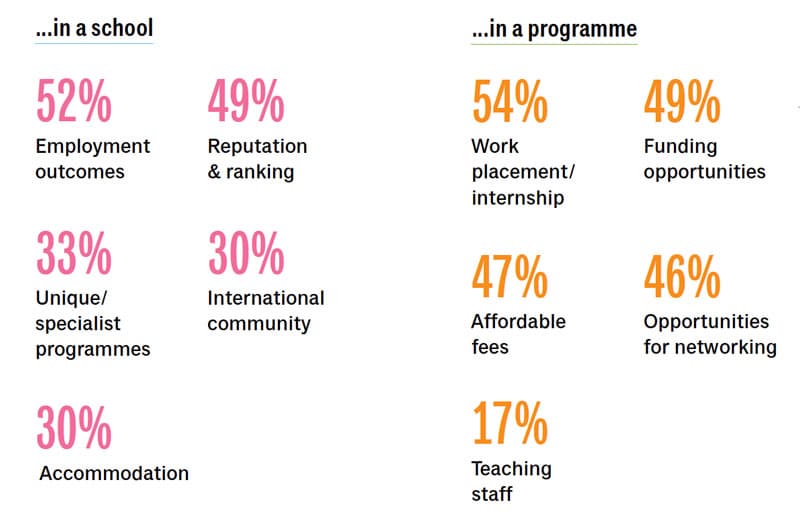The following article is adapted from the 2025 edition of ICEF Insights magazine, which is freely available to download now.

If you think about it, one of the most pressing questions we all want answers to is, “What do students really care about when making study abroad decisions?”
The answers will differ based on factors including a student’s country of origin, degree of financial security, and intention to return home or seek permanent residence in a new country. But if we take a macro lens and explore significant global research conducted this year, we get insights into common themes to consider when recruiting and hosting students.
Practical priorities
Keystone Education Group’s State of Student Recruitment 2024 survey asked more than 27,000 students not just what they consider when comparing institutions, but also what matters to them in a programme.

There are some clear implications in the graphic above. For example:
At the institution level:
- Gather and communicate data on graduate employment outcomes. If this is hard to come by, feature successful alumni in marketing campaigns.
- Highlight rankings. If programme/field rankings are more impressive than institutional rankings, focus on those.
- Understand that accommodation is a top five issue for students researching institutions. Good student housing is a competitive differentiator.
At the programme level:
- Programmes become more competitive if they have an internship/work placement component. This priority was cited 46% more in 2024 than in 2023.
- Students need to know about funding and fees sooner rather than later. Don’t make them hunt for answers in these areas, and don’t let them (or you) be surprised late in the game when they realise they can’t afford your programme after all.
Speed matters
One of the statistics we saw cited the most this year is Keystone’s finding that 85% of students expect a response within 24 hours – a 35% increase over 2023. What’s more, 17% expect a response immediately, up 55% since 2023.
Student recruitment firms Edified and Uniquest collaborated on the 2024 edition of the Enquiry Experience Tracker mystery shopping survey, which found that too many student leads are being neglected. Six international student personas “shopped” 102 institutions in Australia, New Zealand, Europe, and North America. They submitted their questions through enquiry forms, live chat, social media, email, and peer-topeer platforms. The highlights on the left show where there is room for improvement.
Efficient staff structures, a well-implemented customer relationship system, and AI tools can help to respond to the need for speed in international student recruitment.
Communication is crucial
IDP Education conducted important research this year looking at how much international students are influenced by government policies in destination countries. The answer: a lot.
Institutions and associations must continue to advocate for responsible policies that address immigration needs without damaging the ability of countries to attract talented international students. At the same time, institutions and agencies must endeavour to communicate policies in a timely and accurate manner to students and to provide expert advice on applying to programmes that offer them the highest chance of being accepted.
Open to alternatives
During the pandemic, students got used to having back-ups to their preferred destination – and to thoroughly researching border policies, vaccination and test requirements, and rules about on-campus study. These research habits are proving useful again.
In response to quickly changing immigration environments, students are:
- Exploring alternative places to study, researching cost of living, fees, visa rules, etc.;
- Looking into programmes tied to labour market demand. Canada and New Zealand are two examples of countries that now tie better post-graduation work rights to programmes leading to specific occupations (and those occupations are not always STEM-based).
In addition, a 2024 QS survey of more than 11,000 international students interested in business schools found that demand is spiking for programmes that:
- Include a focus in other fields, reflecting the niche and increasingly specialised needs of global employers;
- Have a sustainability orientation. The survey found that an institution’s commitment to sustainable values (including the UN’s Sustainable Development Goals, or SDGs) is now a top three factor affecting students’ choice of institution.
The QS research suggests that there is an urgency to informing students about niche potentials of programmes. Think of ways to market programmes in a creative light that goes well beyond mere description.
Eager for ROI
Students choose to study abroad for many reasons, but research shows time and again that employability is the top driver. For the past five years, for example, “future career impact” has topped the list of student motivations (96%) on Etio’s International Student Barometer (ISB). This year, the ISB included 122,975 international students studying at 155 institutions in 24 countries, and as always, its data is definitely worth paying attention to.
Nannette Ripmeester, Etio’s director of client services for Europe and North America, wrote in ICEF Monitor earlier this year:
“What can institutions and providers do to support this quest for employability? Take employability skills seriously. Globalise your curricula, build in global orientation and skills training because that career workshop at the end of a study programme will not be enough to create employable graduates. Maybe it all starts with the understanding that, for recruitment of new students, you need to start at the end of the student journey by taking steps to ensure better graduate outcomes for your students.”
Ms Ripmeester also believes that institutions – especially through their career services department – must help students to maximise the impact of their study abroad experience:
“When we asked employers [in two Erasmus Impact studies] if they recruit students simply because they have studied abroad, … we found there is no guarantee that study abroad in itself makes someone employable – there is more needed to make that happen. For starters, a graduate should be able to explain what they have gained while being abroad and how these skills can support them in their new role. When graduates can unpack what they have gained abroad, employers become keener in hiring that person. When that graduate can ‘repackage’ their skills in the language of a hiring manager (word of warning: there is no one-size-fits-all approach – this may differ per sector and per country), an employer is more likely to be interested in that graduate. After all, study abroad provides, by its very nature, situations where people develop the skills sought after by the future world of work.”
Key takeaways
There is a theme running through these research findings: think like a student. Think about their priorities, how they make decisions, their demand for immediate answers, and their increasing willingness to consider alternative destinations and programmes. Consider their need to show employers why investing in study abroad was such a good decision. Successful alumni are perhaps the best asset you have. Their success can drive the sustainability of your programmes, your marketing, and your reputation in key target markets.
For additional background, please see:
Source

